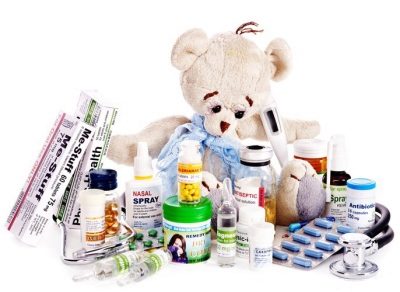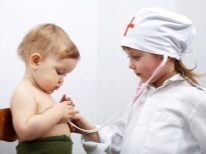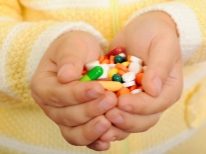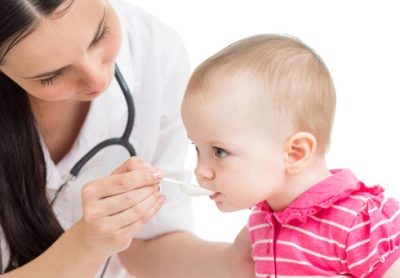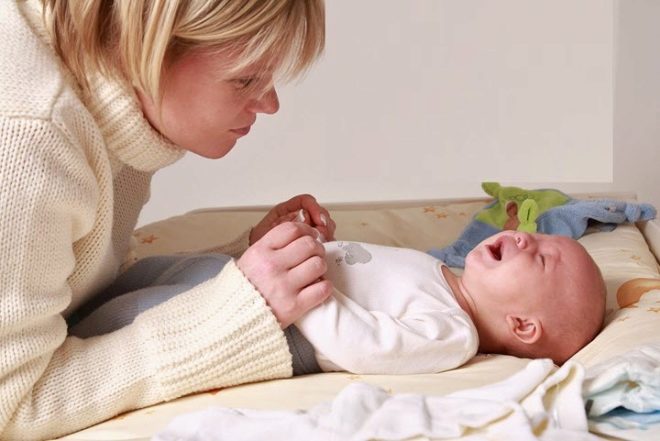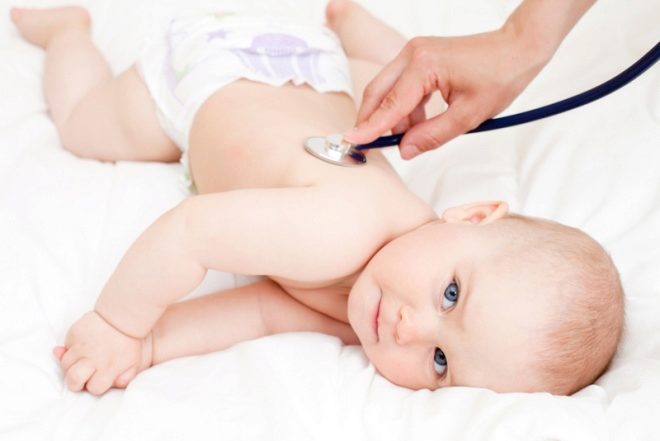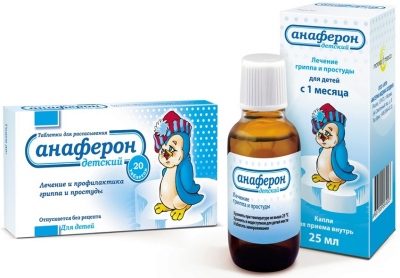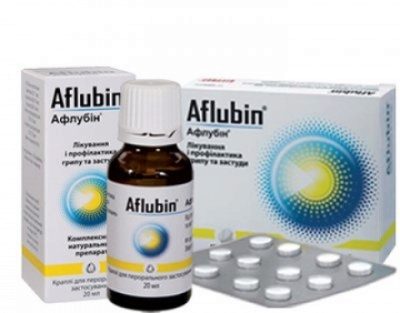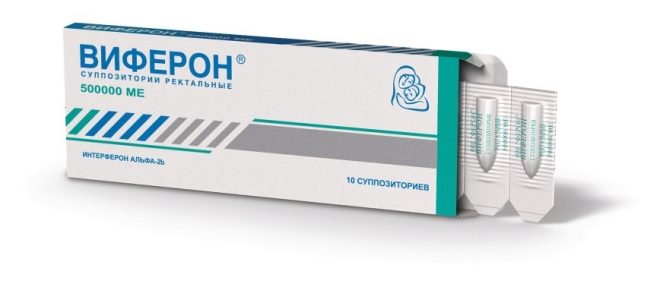Antivirals for children under one year
Newborns and babies to the viruses are virtually defenseless. Immunity “learns” with age, with each new disease, the natural defense of the human body learns to identify and destroy disease-causing "invaders." The newly born crumbs of their own immunity still have little knowledge and ability, he has not met with viruses, unless, of course, my mother has not suffered a viral infection during pregnancy.
In the first month after the birth of the child, the residual mother’s immunity is partially protected. Then, if the baby is breastfeeding, he will receive a certain amount of necessary substances for immune protection with mother's milk. If for some reason a child is bottle-fed or on a mixed diet, his ability to withstand aggressive and omnipresent viruses is significantly reduced.
Parents are often interested in whether it is possible to use antiviral drugs for children up to one year. Let's try to find out together.
We also suggest watching the video release of Dr. Komarovsky on children's antiviral drugs.
Virus drugs
The pharmaceutical market today offers a huge number of items of antiviral drugs, but not all of them are approved for use for newborns and infants. The choice is great, but it is an illusion. In fact, The choice for parents of the baby is limited to several medicinal names.
According to the method of exposure, all drugs of this group are conditionally divided into several types:
- Interferons. Preparations containing artificially prepared in the laboratory an interferon protein, which, in the course of a disease, is produced in the human body independently as a necessary substance for correct and fast work of antibodies.
- Immunostimulants. These drugs act on the immune system of the child, forcing it to quickly give an adequate response to the penetration of the virus.
- Drugs direct antiviral action. Such funds contain substances that prevent the replication of the virus and its further spread.
- Homeopathic medicines. There are no active active ingredients in their composition, but there is a large number of doses of various drugs, diluted to negligibly small quantities, including molecules similar in structure to the virus itself.
Every medicine has its pros and cons. Advertisements tell the parents about the pros, because the products of this group are widely advertised in the mass media. I want to tell my parents about the disadvantages, the producers will not tell about it.
- Interferons able to cause many side effects.
- Immunostimulants and immunomodulators when used frequently, they cause immunodeficiency, when the child’s own natural defense system begins to fail, is “lazy.” It turns out that the baby is regularly treated with expensive good means, and he gets sick more and more often.
- Medicines that act directly on viruses, equally affect all other systems and organs. As you understand, this effect is not mild.
- But only about homeopathic remedies it is impossible to say bad, because they have no side effects, they are harmless, but, unfortunately, are useless.Their effectiveness and effectiveness have not been proven, traditional medicine is skeptical, to put it mildly.
In general, antiviral drugs have a lot of problems with the evidence base. Laboratory was able to confirm only the efficacy of some drugs, mainly related to drugs with direct antiviral effects.. 99% of other drugs exist and cause a lot of questions by their existence. Many doctors tend to believe that they are completely useless. Manufacturers think differently because well-known trademarks bring trillions of profits to them every cold season.
Do I have to give?
Antivirals, according to the prevailing practice in pediatrics, are prescribed for two purposes. This is the prevention of influenza and ARVI and, directly, the treatment of viral infections, which in addition to the flu include chickenpox, measles, scarlet fever, herpes, enterovirus infection along with rotavirus, and many others.
Experts strongly do not recommend often and uncontrolled taking anti-virus drugs. This warning is especially true for newborns and babies.
Remember that their immunity has yet to be the main establishment, he needs to recognize viruses “by sight”, so that after infection he can quickly recognize and destroy them. Without the use of medications, this process of “educating” immunity will go more correctly and quickly. Therefore, it is better to refuse treatment by such means, if possible.
Judge for yourself, drug manufacturers claim that their medicine "effectively relieves the symptoms of flu and ARVI in 5 days." You cannot convince them of deception, but it is also impossible to prove the correctness of such statements.
After all, the immunity of a somatically healthy person and independently, without pills, copes with viruses for approximately the same period of time.
In some cases, antiviral medications are recommended for the child. First of all it concerns children with congenital immunodeficiency (HIV), premature babies, whose immunity is very weak. Such drugs are justified in a very severe course of viral infection, accompanied by high fever, symptoms of intoxication, which is extremely dangerous for infants.
In any case, the decision on taking an antiviral drug should be made by a doctor.
So, what can be assigned to a child from 0 to 12 months?
Drug List 0+
Anaferon children
Russian homeopathic medicine, which is available in a single dosage form - lozenges. Since our crumbs cannot dissolve pills for up to a year, they are advised to "Anaferon" to dilute them in a small amount of cooled boiled water. Dose for babies from 1 month to a year - no more than one tablet per day for the prevention of influenza.
If the baby is already sick, then in the first couple of hours after the onset of symptoms of ARVI they give a pill every half hour, and then a pill three times a day. Be careful, in the composition of the pills - sugar. If the baby is prone to diathesis, inform the doctor about this fact, perhaps he will select another drug for your child.
Aflubin
Homeopathic medicine that comes in tablets "under the tongue" and in the form of drops. It is logical that for a child under the age of a year we will choose drops, since the crumb can choke with the hypoglossal pill. Dosage - 1 drop per day.
If, after all, you bought the drug in pill form, dilute one-fourth part of the pill into 1 dose. "Aflubin" is recommended for the prevention of influenza, if there is someone in the family, as well as for the treatment of an infection that has already begun.
Viferon
This is a drug that belongs to the group containing interferon. It is produced in the form of rectal candlesThis is a rather convenient form for newborns and babies. The dosage in the first year of life should not exceed three suppositories per day. Most often, doctors recommend 1 candle to introduce the child into the rectum three times a day.
This is no longer a homeopathic remedy, and therefore the list of side effects of the drug is quite impressive: the development of severe systemic allergies, the appearance of local allergic itching, the likelihood of autoimmune diseases, etc.
Interferon
As the name suggests, it is a medicine that contains interferon. There are a lot of variants of release forms for him, but for babies up to one year the drug is used exclusively in the form of nasal drops. There are two ways to use it - bury 1 drop in the nostrils 5-6 times a day or inject small cotton flagella soaked in Interferon solution into the nose.
Among these possible negative effects from taking the drug are fever, drowsiness, nausea, upset baby’s stools, severe allergies, itching, etc.
Immunoflazid
This is a syrup that contains only natural herbal ingredients. Babies under one year old are given 0.5 ml twice a day during the illness. You can take this syrup 10-14 days.
Be careful if the crumb is prone to food allergies, because the syrup is pretty sweet. For kids, it makes sense to dilute it with a small amount of water.
Oxolinic ointment
This is a legendary medicine that was used even by our grandmothers, and is still relevant today. It is mainly used for the prevention of influenza and ARVI. It is enough for babies to lubricate the nasal passages three times a day during periods of mass morbidity.
If there is a need to go with the child to the clinic to receive or to the store, be sure to do the procedure before leaving the house and immediately after returning.
General recommendations
- Do not simultaneously give crumbs antipyretic and antiviral. These drugs on the principle of action contradict each other.
- You should not give your child antiviral medications more than twice a year, this can cause problems with immunity.










